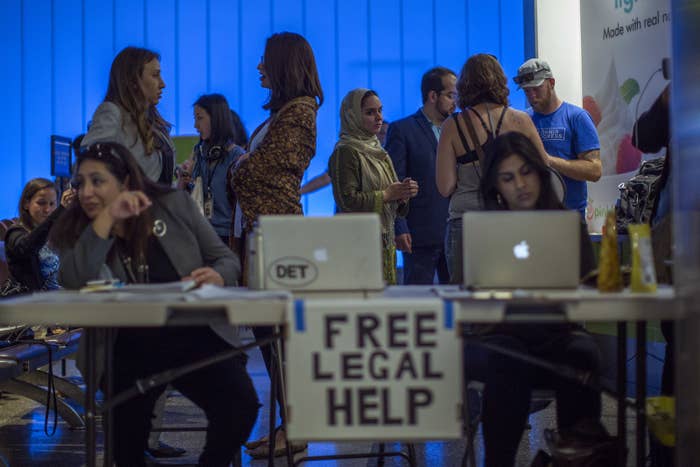
When immigration attorney Jeremy McKinney arrived at the Charlotte, North Carolina, immigration court earlier this month, he was in luck — the court was running late, and the judge hadn’t yet started the day’s proceedings.
McKinney pulled out his iPad, hoping to use the extra few minutes to review a few citations he planned to use as part of that day’s asylum hearing.
But before McKinney could even start up his tablet, a guard stopped him. She said, “‘Oh no, you can’t have on any electronic devices,’” McKinney recalled. The guard added that the only way McKinney could use his device was if the judge gave him permission — after the proceedings had begun.
McKinney was taken aback: Not only was there a 2015 Department of Justice rule explicitly giving him the right to use his iPad, but the government attorney, seated at the prosecutor’s table just a few feet away, was busily typing away on her laptop, its Ethernet cord snaking down the table into the wall.
When McKinney pointed this out, he said, the guard remained resolute. “‘Oh, well she’s a government attorney.’ Those were her exact words,” McKinney recalled.
Frustrated, McKinney turned to the government attorney, who he said shrugged it off.
McKinney’s story is the latest skirmish in a decades-long fight by immigration lawyers to establish a level playing field in the often murky world of the nation’s immigration courts, where technical disparities are having real-world consequences for asylum-seekers. According to the American Immigration Lawyers Association, 90% of its members have reported having cases negatively impacted by a lack of internet access.
And immigration lawyers said that not only has the new administration largely ignored their concerns, but that they worry things could get worse as Attorney General Jeff Sessions and Homeland Security Secretary John Kelly push to scale back the number of asylum applications granted every year.
Unlike traditional federal courts, immigration courts aren’t actually part of the judiciary, but are instead operated by the Department of Justice, and technically considered administrative bodies.
As a result, they don’t operate under the same constraints as federal courts. For instance, petitioners appearing before the courts aren’t guaranteed legal representation, and normal rules of due process don’t apply. Additionally, not only does DOJ write the rules governing immigration courts, but it employs the judges. The government lawyers work for DHS.
And that, McKinney said, “leads to a system that at a minimum seems stacked against the respondents appearing before the court, and of course at worst it literally is stacked against them.”

McKinney and other lawyers warned that unequal access to technology has serious consequences for asylum seekers.
Prosecutors can quickly mine online legal databases to find case law to rebut key parts of an asylum claim, for instance, while lawyers representing a petitioner must rely solely on the materials they brought into court.
That creates a distinct tactical disadvantage. “These things happen live. Technology has its place … if we don’t have access in the courtroom, shouldn’t the [prosecutor] be at the same disadvantage?” McKinney argued.
It’s a pervasive problem. Last year, AILA surveyed its members on internet access in immigration courts. While prosecutors in all 42 courts surveyed had Ethernet access to the internet, only two courts provided Wi-Fi access, and virtually no court provided internet access to petitioners’ attorneys. And while in 12 courts lawyers reported being able to access the internet using cellular data signals, in many cases it was too weak to open sites like Westlaw, one of the primary legal databases in the country.
And that’s just in the courts where immigration attorneys’ electronic equipment is allowed. Most courts that are housed in federal prisons or privately operated detention centers don’t allow attorneys to bring cell phones into their courtrooms, let alone Wi-Fi-equipped laptops or tablets. Even some non-detention courts like the one in Charlotte — those that deal with people out on bond and that aren’t located within detention facilities — still ban the use of electronics despite DOJ’s 2015 policy, or leave it up to individual judges to decide.
Complaints to DOJ have largely fallen flat. During meetings in 2015 and 2016 with DOJ officials, AILA raised the issue. According to meeting notes provided to BuzzFeed News by AILA, during both meetings DOJ officials were noncommittal, responding to concerns by referring AILA to existing policy.
It turned out communication would only get worse this year. AILA and the DOJ had a meeting scheduled for April 5, 2017. To set an agenda for the meeting, AILA sent a letter that laid out its concerns about use of technology during proceedings, arguing, “In areas where internet access is unavailable to one party, no party should have internet access.”
On April 3, DOJ abruptly cancelled the meeting, and so far hasn’t responded either to the letter, or to requests to set up a new meeting. DOJ officials were also a no-show at AILA’s annual meeting in New Orleans last month, where they were supposed to discuss a host of policy issues. It’s unclear why DOJ backed out of the meetings, though the decision came just weeks before the head of the immigration court system, Juan Osuna, resigned as part of the transition of power to the Trump administration.
In an email statement provided to BuzzFeed News, DOJ spokesperson Lou Ruffino said the department “supports access of all parties to necessary resources during the course of immigration court proceedings,” and that it is “researching potential solutions” to the current lack of internet access.
But that assurance will likely do little to ease the concerns of McKinney and other immigration attorneys. “The immigration court is not independent,” McKinney said. “Immigration court is simply an arm of the Department of Justice, [and] any decision can be reversed by Jeff Sessions.”
CORRECTION
The Department of Justice does not employ government attorneys in immigration courts, as an earlier version of this story reported.
